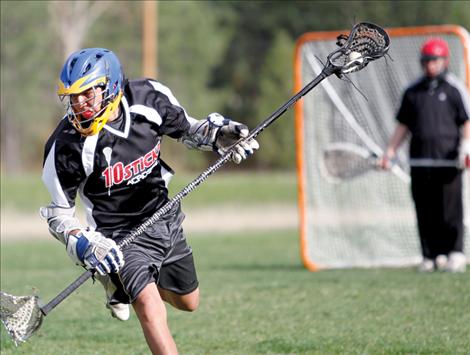Ten Sticks Lacrosse to start new youth league
Hey savvy news reader! Thanks for choosing local.
You are now reading
1 of 3 free articles.
MISSION VALLEY — Since Alex Alviar created Ten Sticks Lacrosse nearly two years ago, the program has grown into one of the most respected lacrosse clubs in Montana. Now, with the first class of athletes set to graduate, Alviar is expanding the vision to a new, low-commitment youth league designed specifically for kids on the Flathead Indian Reservation: Next Nation.
“It’s like Little League,” Alviar said. “Everything is in-house; it’s low-commitment in terms of time and travel — we’re not driving to Missoula or Billings or Bozeman — and it’s relatively low cost, so it’s a great entry-level way for younger kids to play lacrosse and get the basic skills.”
Alviar said he saw a need for such a club after the original Ten Sticks players started growing up and moving on.
“Ten Sticks has done really well for a high school program, but we wanted to make sure that we built a more youth-oriented program to help the overall growth of the program,” Alviar said.
The Next Nation league is designed for boys and girls ages 8 to 14, but participants will not play lacrosse. Instead, the kids will play chumash — a traditional cousin to lacrosse with several key differences: the teams are smaller; the playing area is smaller; there are no specified positions like goalies or defenders; the goals are simple; and the game doesn’t require a lot of referees.
“The easiest way to explain it would be to take a basketball-size court area and place the nets in the two circles,” Alviar said. “The goals are essentially just two PVC posts bolted to a board with a mesh net between them. It’s a small net, so no goalies.”
Alviar said chumash is closer to the traditional way to play lacrosse, as there are no specialized positions and it is played more like basketball. He believes it is a great way for the kids to get a feel for the game while learning passing, catching, dodging and moving skills early-on.
“I guarantee that if a kid plays a lot of chumash, they’ll grow up to be an incredible lacrosse player,” Alviar said, likening chumash to futsal — an indoor version of soccer played in a much smaller area.
“Brazilians play futsal so much that it’s very easy for them to play on a large field, because they’ve trained the majority of their time on basketball-court size, close-quarters spaces.
“So, when you open that up to a soccer-field-size area, they go, ‘Oh, wow. I have much more room; this is easy,’” he said.
Alviar hopes to have traveling teams in the years to come, but for now he just wants to get the league going. In addition, Ten Sticks now has a girls’ coach, so the club will be playing high school and possibly middle school level girls’ lacrosse.
Next Nation and Ten Sticks’ official signup day is Feb. 20 from 6:30 to 8:30 p.m. at Salish Kootenai College’s Vic Charlo and Johnny Arlee Theatre, but the night promises to be much more than your average sport signup.
International Traditional Game Society board member Arleen Adams said she’s been on a mission to preserve native games for the better part of her life — 35 years or more. She has served on various committees and has been a part of ITGS for 25 years, running clinics and instructing people on native games.
Alviar and Adams met at an ITGS workshop some time ago. As a lifelong lacrosse player and all-American athlete, the game had been a part of Alviar’s life for many years. Even so, he’d not understood the depth of the game’s cultural significance until the ITGS workshop. From that moment on, Alviar and Adams collaborated on as many projects as possible.
“Alex is awesome,” Adams said. “He came to one of our native games clinics and he’s been an awesome instructor ever since. He’s a great teacher, and he’s very motivated in what he does and what he’s learned and what he’s passing on to all the young kids.”
Keeping with the pair’s tradition of working hand-in-hand, Adams will run a workshop for kids during the registration day, making balls for all sorts of native games.
“What we’re doing is making traditional game balls in order to play various traditional native games. That’s kind of the native games series half of the day. The rest will be the parent and player information night for Ten Sticks and the debut of the Next Nation league,” Alviar said. “The kids can come in and if they’re just there for the lacrosse information, that’s fine, but they can also learn more about the traditional games and the traditional games society.”
Alviar said he believes it is very important to keep making the ITGS a prominent feature of the program.
“This year, I feel incredibly well taken care of because a lot of parents and coaches have already started stepping up and taking leadership positions, willing to become new coaches or referees and be a part of the board of directors. I spent the first two years building a team of kids. This year, I’m building the internal organization, and we’re seeing those results already,” Alviar said.
The league already has six coaches and several refs, and is beginning to function “more like an organization rather than a bunch of coaches running around.”
Alviar added that this year, lacrosse equipment is limited, so equipment will be given out on a first-come first-served basis. The first 25 new members to register Feb. 20 with Ten Sticks and Next Nation get their U.S. Lacrosse membership for free — a $35 value for high schoolers and $15-20 for kids.
















